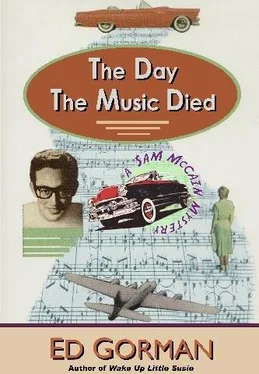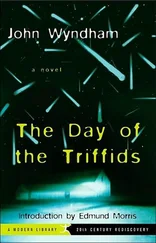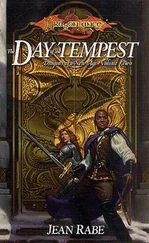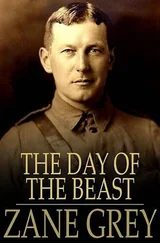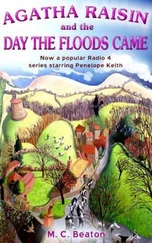Ed Gorman - The Day The Music Died
Здесь есть возможность читать онлайн «Ed Gorman - The Day The Music Died» весь текст электронной книги совершенно бесплатно (целиком полную версию без сокращений). В некоторых случаях можно слушать аудио, скачать через торрент в формате fb2 и присутствует краткое содержание. Жанр: Криминальный детектив, на английском языке. Описание произведения, (предисловие) а так же отзывы посетителей доступны на портале библиотеки ЛибКат.
- Название:The Day The Music Died
- Автор:
- Жанр:
- Год:неизвестен
- ISBN:нет данных
- Рейтинг книги:3 / 5. Голосов: 1
-
Избранное:Добавить в избранное
- Отзывы:
-
Ваша оценка:
- 60
- 1
- 2
- 3
- 4
- 5
The Day The Music Died: краткое содержание, описание и аннотация
Предлагаем к чтению аннотацию, описание, краткое содержание или предисловие (зависит от того, что написал сам автор книги «The Day The Music Died»). Если вы не нашли необходимую информацию о книге — напишите в комментариях, мы постараемся отыскать её.
The Day The Music Died — читать онлайн бесплатно полную книгу (весь текст) целиком
Ниже представлен текст книги, разбитый по страницам. Система сохранения места последней прочитанной страницы, позволяет с удобством читать онлайн бесплатно книгу «The Day The Music Died», без необходимости каждый раз заново искать на чём Вы остановились. Поставьте закладку, и сможете в любой момент перейти на страницу, на которой закончили чтение.
Интервал:
Закладка:
“For another thing, I need to ask him some questions.”
“‘Bout what?”
“Just something that happened recently.”
“I can’t put you on to Darin less you first put me on to why you want him.”
“He paid me a visit last night.”
“Oh?”
“Late last night.”
“Oh?”
I had a growing audience. They’d watch me when I was speaking, then they’d watch the bartender when he spoke. Back and forth, forth and back. It was better than shuffleboard.
“I’m just trying to find out why he came to my place.”
“Maybe you’re mistaken. Maybe it wasn’t Darin at all.”
“It was Darin, all right. I’m just curious is all.”
“Just to find out what he wanted last night.”
“Right.”
He’d started glancing to his right and that was making me curious. There was a curtain hanging there. A doorway. In the back there’d be stacks of beer cases and other tavern supplies. There might also be a Darin Greene.
Though it was winter, the bartender wore only a white T-shirt. He kept pawing his black hands on the front of the shirt now. He was nervous. He kept glancing at the curtained doorway.
“You boys make sure he don’t move from here.”
“Sure thing, Donny,” one of the customers said.
“I’ll be back.”
The curtain setup surprised me. There was a door behind the curtain. When it opened, I could hear the click of dice rolling across the floor.
“C’mon, you motha,” an angry colored voice said. “Be good to me for once, you bitch.”
From his groan, I could tell that the dice hadn’t been good to him this time. The door closed.
We just stood there watching each other, the men at the bar and me.
“You don’t want to screw with Donny,” one man said.
“No?”
The man shook his head. “He don’t look like it now, maybe, he’s got that little gut on him and all, but he had thirty-two professional fights. He even fought Hurricane Jackson in Chicago one night.”
Hurricane Jackson was a legendary slugger who had never quite mastered the art of boxing.
What he knew how to do was punch and that had taken him a long, long way, further than his limited skills deserved. If Donny had fought him, he must have had at least a respectable career. I was impressed. Donny’s career was a long way from my Golden Gloves glory.
Two things happened at once. Donny came back and a car engine started up. A big car engine. Out back. An Oldsmobile.
“I thought he mighta snuck out the back way,” Donny said. “But he wasn’t there.”
“I see.”
“But if I see him, I’ll tell him you was lookin’ for him.”
“I’d appreciate that.”
Donny nodded to my beer. “Hate to see a beer wasted like that, man.”
“I just remembered something I need to do.”
“Well, I’d bet you could hold on here another five minutes, couldn’t you? We just startin’ to be friends, man.” He was trying to stall for time to give Darin a good five-minute head start. He didn’t try to disguise his nod to a giant economy-size guy down at the end of the bar. The man slid across the space separating bar from front door. The front door vanished when he took his place in front of it.
Donny the gatekeeper decided to be extra careful for the important man he represented.
He gave Darin a ten-minute head start for good measure.
Nineteen
I sort of liked the music they played in Leopold Bloom’s. Not that I had any idea exactly what it was, classical music not being my preferred form of listening. But this, whatever it was, was nice.
The store was laid out in three sections. The books were up front. The records were in the center. And the home furnishings, all of them expensive and many of them mysterious to a hayseed like me, were at the rear. There were Persian rugs on the floor and large photographs of authors from Gertrude Stein to Jack Kerouac on the walls. I’d really liked On the Road but I wondered what a working-class guy like Kerouac would have made of the Renaulds. They’d have a tea for him and show him off as they would a new car and then, when he’d left, they’d talk about him with the easy intimacy of true friends. I’m leery of people who run stores like these. They’re unimportant to the world at large, but within their own domain, they are kings and queens, handing down opinions and judgments like hanging judges ordering executions. They’d gone to the University of Iowa, the Renaulds, and were, at various times, working on novels, paintings and musical compositions that would probably be simply too good to ever show the ingrate world. Steve Renauld had come from money and his father had bought him everything but the one thing Steve wanted most-talent.
It was a few minutes before anybody appeared.
A wan young woman, pretty in a studied way, came out of the back room. She wore a black turtleneck, black jeans and sandals.
Francois Sagan, a writer I liked, had shown Midwestern girls how to look European: get the hair shorn, wear the black clothes and look innocent and world-weary at the same time. It took a certain concentration, no doubt about it, looking that way.
I said, “Is Steve around?”
“He’s upstairs doing the books.”
“I’d like to see him.”
“I don’t think I recognize you.”
“I buy most of my books down at the bus station.”
She didn’t know how to take that. Was I joking? It happened to be true. The bus station had large wall racks of paperbacks.
“He really hates to be interrupted when he’s doing the books.”
“I won’t need much of his time.”
“God,” she said, “you really can’t take a hint, can you? He’s busy. If you’d like to leave your name and number, I’ll have him call you.”
She was beginning to irritate me, which took some doing, given how pretty she was.
“Tell him it’s about Susan.”
“Susan.”
“Uh-huh. Susan.”
“No last name?”
“No last name.”
She seemed to see me for the first time, and looked mightily displeased at the information her eyes were receiving. “That crack you made about buying your books at the bus depot? You weren’t kidding, were you?”
I relished her disdain. “Uh-uh. That’s where I buy most of my magazines, too.”
Just then, the classical orchestra chose to swell up, as if in angry response to what I’d just said.
“I’ll go talk to him.”
“I appreciate that,” I said.
“He won’t be happy.”
“Life,” I said, “is like that sometimes.”
She went up and he came down. Quickly. She hadn’t been kidding about him being unhappy. He had a gaunt face with little James Joyce glasses and auburn hair too long for his skinny neck and long head. He wore a white starched shirt with a tab collar, a dark vest and jeans. “Just what are you trying to pull?”
“I wanted to talk to you about Susan.”
“Susan who?”
I made a face. “C’mon, you can do better than that.”
“I know a lot of Susans.”
I walked over and picked up a copy of F. Scott Fitzgerald’s The Crack-Up.
“Good book.”
“I don’t want to talk about books.”
“Really?” I said, looking at him.
“Usually, you can’t wait to give your opinion.”
He leaned toward me and said, “Who the hell told you, anyway?”
“Say her name.”
“What?”
“Say her name. You owe her that much.”
He shook his head. “You bastard.”
The front door opened and Eileen Renauld came in. She wore a cape and a beret and a pair of dramatic black pants and leather boots that laced up to her knees. She had large and dramatic features, austere yet imposing.
She wasn’t as petulant as her husband but he was a few years older and had had more practice.
Читать дальшеИнтервал:
Закладка:
Похожие книги на «The Day The Music Died»
Представляем Вашему вниманию похожие книги на «The Day The Music Died» списком для выбора. Мы отобрали схожую по названию и смыслу литературу в надежде предоставить читателям больше вариантов отыскать новые, интересные, ещё непрочитанные произведения.
Обсуждение, отзывы о книге «The Day The Music Died» и просто собственные мнения читателей. Оставьте ваши комментарии, напишите, что Вы думаете о произведении, его смысле или главных героях. Укажите что конкретно понравилось, а что нет, и почему Вы так считаете.
